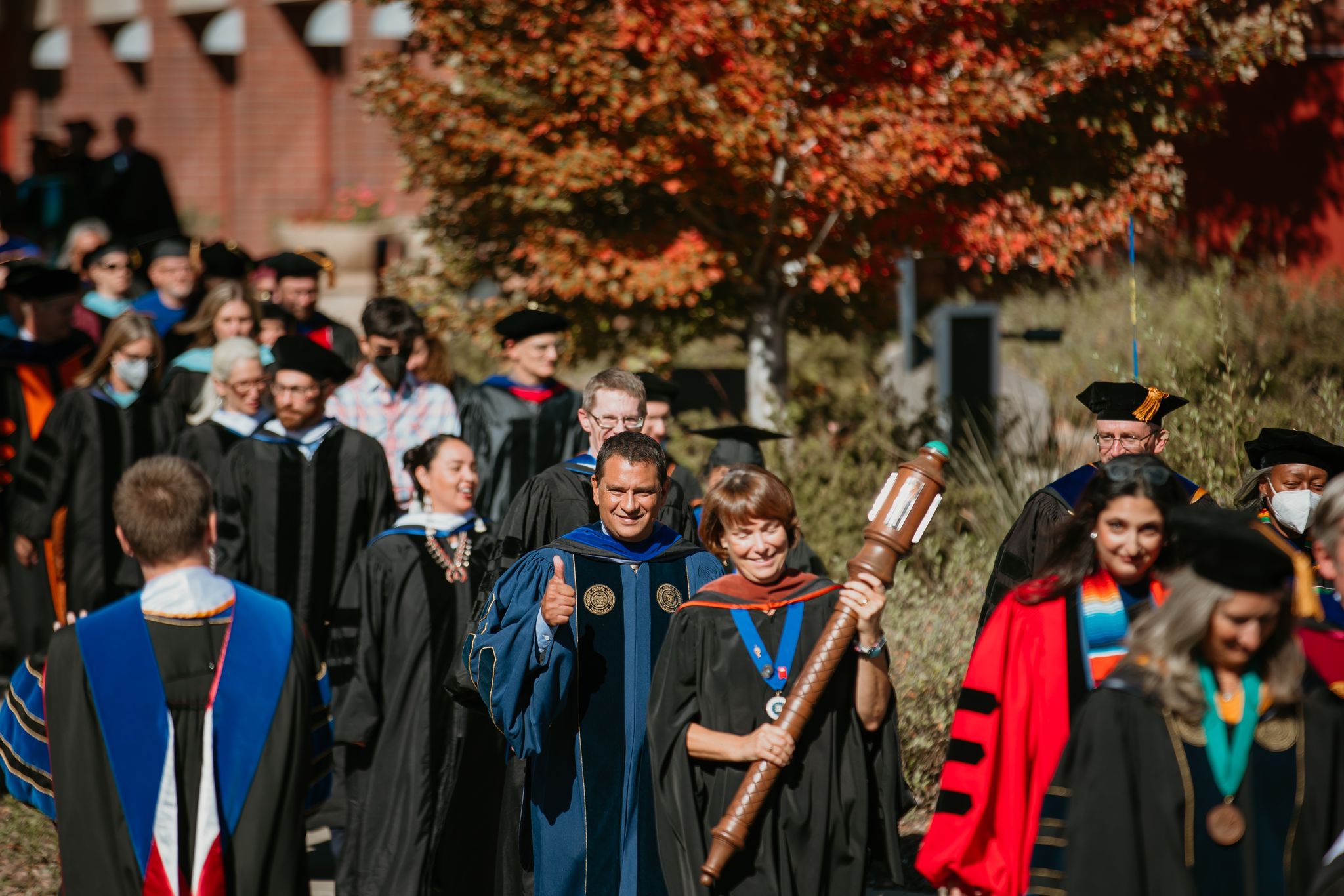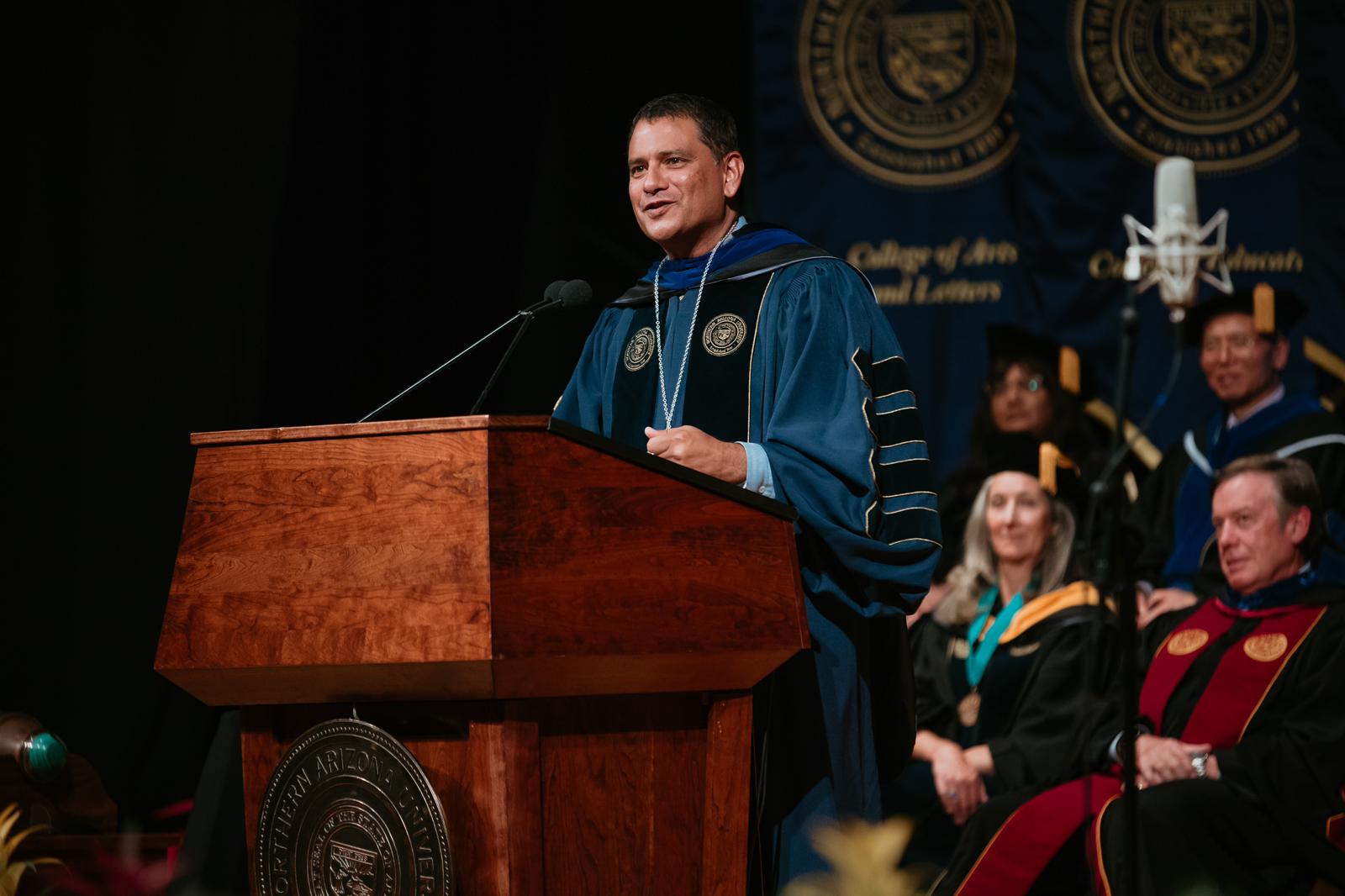Throughout his career, José Luis Cruz Rivera has always championed the transformative power of higher education to advance opportunity and improve the lives of students and the communities they represent. “In my work, this means working every day to eradicate disparities to access and attainment, broaden opportunity to individuals, and ensure that we deliver equitable postsecondary value,” said Cruz Rivera, president of Northern Arizona University. “The promise of higher education can only be fully realized if it is affordable and accessible to all.”

As NAU president since June 2021, Cruz Rivera has strived to do exactly that. “I’m pleased to have been able to advance access and equity-driven initiatives that will improve the fortunes of countless students, including the Access2Excellence program, which guarantees full coverage of tuition costs for Arizona students with less than $65,000 in annual household income,” he said.
Prior to becoming NAU’s leader, Cruz Rivera and his wife had visited and marveled at the beauty of the Flagstaff, Arizona area, which is home to the university (among more than 20 other campuses statewide). But what ultimately attracted him to becoming president was “the opportunity to build upon this institution’s legacy of educational opportunity and transformative change.”
The former chair of the Arizona Board of Regents, Chair Larry E. Penley, also described Cruz Rivera as “a proven innovator in higher education who keenly understands the enormous opportunities that NAU offers as well as the challenges facing higher education.” He went on to say that “his unsurpassed commitment to diversity, equity, and inclusion, coupled with a long track record as a leading national advocate to improve educational outcomes for all students — especially those who have historically been underserved — will serve Arizona and NAU well.”
Born in Puerto Rico, the president is familiar with what it means to be a first-generation minority student in higher education. Although his parents had only graduated high school, Cruz Rivera’s mother always instilled in him the value, promise, and boundless opportunity represented by postsecondary education.
As a child growing up in Puerto Rico, Florida, California, and Honduras, Cruz Rivera was interested in pursuing a medical or law degree. But later, his interests changed to engineering. “My mother’s encouragement fueled my aspirations, even in the midst of adversity,” he said. “And the doors that a university education opened for me — and my children — have affirmed and inspired my own commitment to access, equity, and excellence.”

Cruz Rivera’s original plan was to earn a bachelor’s degree in electrical engineering from the University of Puerto Rico-Mayagüez (UPRM) and go straight into the industry. “But, along the way, I became a student-parent and had to juggle many responsibilities inside and outside the university. I was fortunate to participate in undergraduate research projects and internships that broadened my perspectives of the field and allowed me to finance my education,” he said. “As graduation day neared and I had an employment offer in hand, a faculty member suggested I should go straight to graduate school, earn a doctorate degree, and return to UPRM to work as a faculty member.”
Honored by the suggestion and aided by UPRM’s forgivable loan program, Cruz Rivera decided to earn a PhD from Georgia Tech. Ultimately, he returned to UPRM to help broaden participation in STEM and to advance his research area through several grants, including the National Science Foundation Career award. “Early on in my career, I once again found myself juggling many responsibilities at UPRM,” he said. “I served as chair of the Department of Electrical and Computer Engineering and dean of Academic Affairs, among other administrative roles.”
Since then and prior to his arrival at NAU, Cruz Rivera’s career has included the following: chief student affairs officer of the Puerto Rico System; chief technology officer of a startup company; vice president of Higher Education Policy and Practice at the Education Trust; provost of Cal State Fullerton; president of Lehman College; and executive vice chancellor and university provost of the City University of New York.
“Throughout this journey, one thing has been consistent,” he said. “That has been a drive to advance educational equity and elevate academic excellence for all who seek to meet their full potential.”
Cruz Rivera feels extremely at home at NAU, which he describes as a fantastic institution with dedicated faculty, staff, and exceptional students. “We’re proud of a longstanding commitment to student success, where we center on student learning, support, wellbeing, and outcomes throughout our institutional decision-making,” he said. “It’s a university on an exceptional track for the future. The energy and accomplishments of the last year demonstrate just how authentic the university community’s commitment is in delivering equitable postsecondary value and taking innovative approaches to broadening access throughout Arizona and beyond.”
As NAU’s leader, Cruz Rivera has worked tirelessly with university stakeholders to create a new strategic roadmap called NAU 2025—Elevating Excellence. This vision includes making NAU tuition-free for households earning $65,000 or less and ensuring that working-class families have no out-of-pocket expenses to pay during the school year. Other aspects of the plan include increased workplace flexibility; supporting diverse faculty expression and a Freedom of Expression Statement (further committing to creating an environment of free and open inquiry); and a commitment to achieving carbon neutrality by 2030. In addition, the plan foresees allocating $81 million in new investments to support broadening equitable access to postsecondary education, investing in programs that can ensure the enrollment of a more diverse group of high school students; and a guarantee that anyone with a 3.0 GPA or higher is admitted to NAU.
In addition, NAU created a new, first-of-its-kind partnership with all ten community college districts across the state and the Arizona Commerce Authority (ACA) to launch the Arizona Attainment Alliance (A++). This unique partnership aims to harness the collective impact of distinct institutions based on a shared desire to dramatically boost Arizona’s postsecondary attainment rate.
“Moving forward, with the pathways being developed in collaboration with our community college partners throughout A++, I’m excited for how we can broaden educational access even further, touching every county and every corner of the state with fully articulated and seamless pathways for students to start at their local community college and transfer to NAU to earn a high-quality postsecondary credential,” said Cruz Rivera. “We are also ensuring that our academic programs are aligned with workforce needs so that students can more seamlessly realize their full potential and enjoy postgraduate success.”
As a Hispanic Serving Institution, NAU has long addressed the needs of Hispanics, which Cruz Rivera aims to continue doing. With Hispanics representing 25 percent of the university, “serving Hispanic, first-generation, and other historically underrepresented student populations is a core goal at NAU,” said the president.
Organizations serving Hispanics include: the Latine Student Union, Kappa Delta Chi, Gamma Alpha Omega, Hermanas United for Change, LUCHA (Living United for Change), La Fe-Latino Christian Fellowship of InterVarsity Christian Fellowship, Omega Delta Phi, Los Cristeros, NAU Society of Hispanic Professional Engineers, No Más Muertes (No More Deaths), NAU Spanish Language Club, and the Spanish Pre-Health Organization.
“We offer holistic student support services, exceptional academic programs, and an affordable and accessible pathway to realizing college-going aspirations,” said Cruz Rivera. “With Access2Excellence, we are ensuring that these students have a clear message that NAU—and a university education—is for them.”
Beginning in Fall 2023, Arizona students from households making $65,000 or less per year will be able to attend tuition-free. “That’s huge for our growing Hispanic communities in Arizona. In addition, we’re better aligning our admissions standards with high school graduation requirements, ensuring that students know higher education isn’t about excluding, but rather including and ensuring that they have a place at NAU to reach their full potential,” said the president.
“The work ahead is hard,” said the president. But it seems there’s no one better for the job than he is. After all, he’s come to see that “student success requires more than student aptitude, motivation, and resilience.”
“I learned that how institutions carry out their mission really matters,” he said. “And finally, as a parent, I have learned the multigenerational power of a college degree.” •